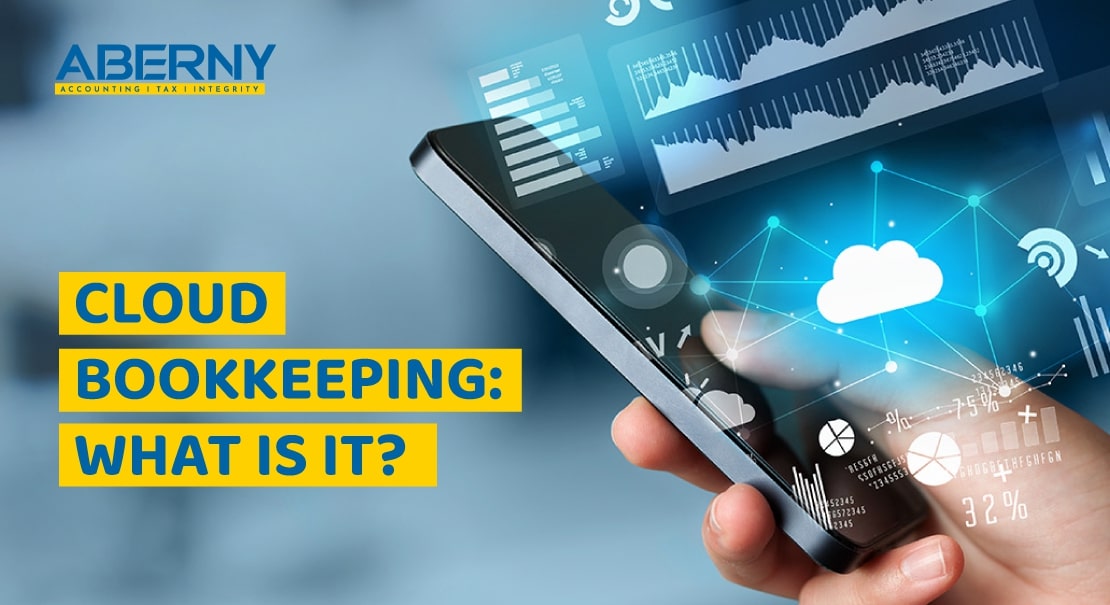



Let’s go back to the basics to demystify cloud bookkeeping! It is super simple… you would have used Google Drive, Office 365 or Dropbox, or maybe some other cloud computing software to streamline your business process. All of these programs store information in the cloud, where it is processed and kept for remote access from any device having an internet connection.
Cloud accounting or you can say bookkeeping software works in a similar way – daily transactions, invoicing, billing, and other important data is sent to a secure server, where there are no chances of data deletion, loss, or theft. It is an incredible invention that is constantly developing and ever-expanding.
But because of its growing usage, cloud accounting now holds an entirely distinct meaning… it’s time to dive in a little deeper and explore different aspects.

Without getting too technical, cloud computing simply means that your data and software programs are stored on remote servers connected to the internet rather than on your computer's hard drive or server (s). This amazing solution has eliminated duplicate and time-consuming work that accounting used to perform manually.
In general, cloud accounting gives cloud bookkeepers more access to real-time data, which improves their involvement with financials and aids decision-making. Besides, cloud bookkeeping keeps the records updated while streamlining and automating repetitive tasks.
Continue reading to learn more about how it works and why it might be a good fit for your company.
For some reason accounting and bookkeeping are often used interchangeably… but let us break the ice. There are different, cloud accounting focuses on the bigger financial picture, -while bookkeeping is concerned with recording daily transactions in a consistent, error-free format.
Keeping this in mind, consider the following tasks that cloud bookkeeping software can help with:
Preparing the statement of income
Organizing the balance sheet
Generating invoices
Posting debits and credits
Maintaining the ledger
Maintain the payrolls
Recording financial transactions
At a minimum, cloud bookkeeping software will include features to automate and streamline these tasks.
FreshBooks is a pioneering cloud-based finance and accounting software that assists self-employed professionals, freelancers, businesses with contractors, businesses with staff, and other types of businesses. FreshBooks' features and capabilities are intended for both business owners and accountants. It also has a high level of usability right out of the box. As a result, even inexperienced users can get their hands on it in minutes.
It actually streamlines the time tracking and invoicing process while offering a robust set of features for thriving businesses. Even those without an accounting background who work as freelancers can easily deploy the software.
Well, it is a web-based ERP software featuring a cloud accounting tool. It morphs the general ledger, streamlines tax management, optimizes AR, and automates AP. Not just this, NetSuite ERP improves your financial control by streamlining and simplifying the accounting process. NetSuite ERP eliminates duplicate data entry automatically, enhancing the precision of your data.
Moreover, y our access to real-time data and metrics gives you additional insight as you handle your day-to-day operations. Above and beyond, NetSuite ERP ensures that all of your transactions comply with international bookkeeping standards as you work to speed up your financial reconciliations.
It has benefitted cloud bookkeepers in numerous ways…
QuickBooks Online is cloud accounting software designed for small businesses, freelancers, startups, and bookkeepers. This accounting software solution includes a range of features for expense tracking, invoice management, tax calculation, and sales tracking.
This software uses advanced and industry-recognized security standards to ensure that your accounting data is always secure. You can easily manage and access financial information through any device at any time, and you can even collaborate with your bookkeepers and stakeholders on the cloud.
Xero is a server-based accounting software designed for accountants and bookkeepers. Xero has all the necessary features and tools that an owner needs to run a business successfully. It has a compelling and intuitively designed dashboard that is easy to use. It allows users to pay bills on time, track spending, capture costs, and even set up bank feeds.
From providing estimates to invoicing, you can easily track projects with Xero. The aspect of contact management enables you to manage your contacts as well as your accounting processes on the same platform. Xero provides customized solutions for accountants and bookkeepers, including Xero HQ for staff and client management, Xero Ledger, and Xero Cashbook.
Apart from this, you can integrate the software with different payment gateways to facilitate faster payment. FYI, it can be integrated with 800 apps that will surely expand the capabilities of your platform.
Equipped with proprietary payroll processing technology, Paychex is another top cloud bookkeeping software. It simplifies payroll tax and management for businesses of all sizes. Above all, Paychex provides simple tools for running payroll through a mobile application or you can say via online platforms. You can also use Paychex Voice Assist if you prefer to run your payroll hands-free.
This is a voice-activated technology helps you approve, review, and submit checks while receiving real-time insights without pressing a single button. Paychex also supports employee self-service, which allows your workers to update their individual and bank info, and access their salary slips, tax forms, and more.
If you compare traditional bookkeeping with contemporary bookkeeping practice, you may find plentiful benefits that would make your business process simpler.
Have a look at what bookkeeping cloud systems can do for you:
From client payments to account information, you must keep your financial data secure. Is the cloud secure? Very. Cloud-based bookkeeping software encrypts data to protect it from snoopers. While a physical device could be stolen and sensitive financial information can be compromised, cloud software keeps your account secure.
Not just this, but we are living in a fast-paced world, where everything is digitized. Hence, to stay ahead in the game businesses need to adapt to the changes. Besides, server-based bookkeeping has uncountable benefits that can make your business operations smooth. So, opting for it is a wise decision. But if you think you cannot handle the bookkeeping software, get in touch with ABERNY – the cloud bookkeepers with a wealth of experience and industry knowledge can do wonders for you.